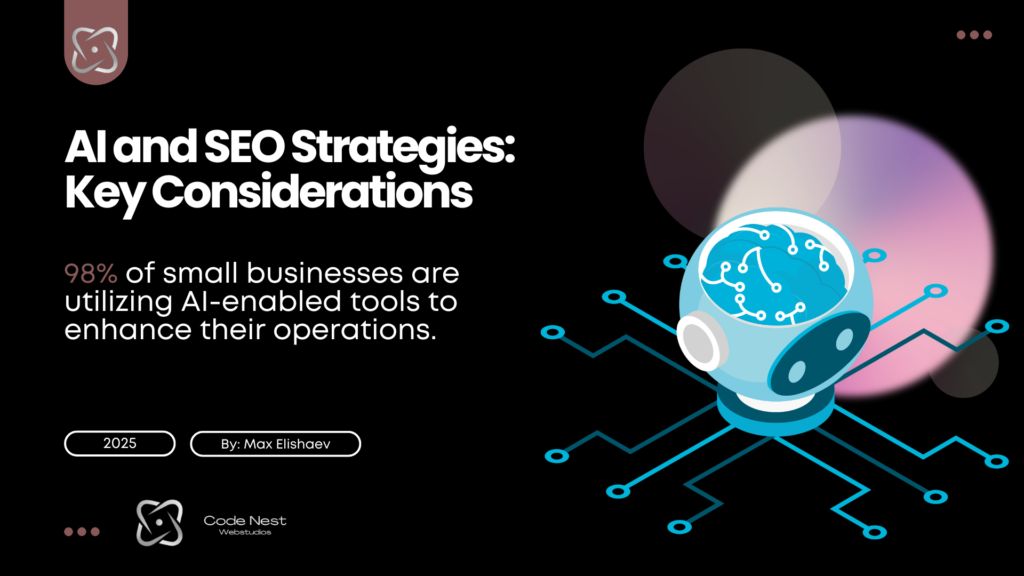AI & SEO Strategies: Key Considerations for Small Brands in 2025

In 2025, the digital landscape continues to evolve, making it essential for small brands to adapt and thrive. Artificial intelligence (AI) has revolutionized the way businesses approach search engine optimization (SEO), offering small brands powerful tools to compete with larger corporations. This blog post explores how small businesses can leverage AI to boost their SEO efforts and drive significant growth.
1. The Growing Role of AI in Small Business SEO
AI tools are no longer reserved for big brands. In 2025, small businesses are increasingly adopting AI-driven solutions to optimize their digital presence. According to a survey by the U.S. Chamber of Commerce and Teneo, 98% of small firms are now utilizing AI-enabled tools to enhance operations. Additionally, 40% are using generative AI applications like chatbots and image creation tools to improve customer engagement and efficiency.
AI’s ability to analyze data, predict trends, and personalize content gives small businesses a competitive edge, allowing them to target specific audiences with precision.
2. Leveraging AI for Keyword Research and Content Creation
AI tools simplify keyword research and content creation by identifying high-performing keywords and generating SEO-optimized content. Platforms like SEMrush, Ahrefs, and ChatGPT provide actionable insights into:
-
Trending long-tail keywords for niche markets.
-
Questions frequently asked by target audiences.
-
Competitive analysis to uncover content gaps.
Small businesses can use these insights to create blog posts, landing pages, and product descriptions that rank higher on Google while addressing customer needs.
3. Enhancing Local SEO with AI
For small brands, local SEO is a game-changer. In 2025, 64% of small businesses have established a local SEO presence to attract nearby customers. AI tools like BrightLocal and Moz Local automate the process of optimizing business listings, managing reviews, and ensuring NAP (Name, Address, Phone) consistency across platforms.
Additionally, AI can help small businesses:
-
Monitor local search trends.
-
Create hyper-localized content.
-
Identify areas for improvement in Google My Business profiles.
These efforts can significantly boost visibility in local search results, driving foot traffic and online conversions.
4. Streamlining User Experience with AI
Search engines prioritize websites that offer excellent user experiences. AI can help small businesses create seamless, engaging websites by:
-
Analyzing user behavior to optimize navigation.
-
Implementing AI-driven chatbots for real-time customer support.
-
Personalizing content based on visitor preferences.
A website that loads quickly, is mobile-friendly, and provides relevant content will rank higher on search engines, ensuring better visibility for small brands.
5. Building High-Quality Backlinks with AI
Backlinks remain a crucial factor in SEO success. AI tools like BuzzSumo and LinkAssistant enable small businesses to identify link-building opportunities by:
-
Finding authoritative websites in their niche.
-
Analyzing competitor backlinks.
-
Automating outreach efforts for guest posting and collaborations.
By building a strong backlink profile, small businesses can establish credibility and improve their search engine rankings.
6. Measuring Success with AI Analytics
Tracking and analyzing SEO performance is critical for continuous improvement. AI-powered analytics tools such as Google Analytics 4 (GA4) and HubSpot provide small businesses with valuable insights, including:
-
Website traffic patterns and user demographics.
-
Conversion rates from specific CTAs.
-
Performance of individual keywords and landing pages.
Regularly reviewing these metrics helps small businesses refine their strategies and stay ahead of the competition.
7. The Future of AI and SEO for Small Brands
As AI technology advances, small businesses will gain access to even more sophisticated tools. Predictions for the future include:
-
Voice Search Optimization: Catering to the growing number of voice search users.
-
AI-Powered Visual Search: Leveraging image recognition technology for e-commerce SEO.
-
Predictive Analytics: Anticipating customer needs and preferences for proactive marketing.
Embracing these innovations will ensure small brands remain competitive in an ever-changing digital world.
Conclusion
In 2025, small businesses have unparalleled opportunities to harness AI and SEO strategies to boost their online presence. From keyword research and local SEO to user experience and backlink building, AI provides the tools needed to compete effectively in a crowded marketplace.
By adopting these strategies and staying ahead of industry trends, small brands can not only rank higher on Google but also build lasting relationships with their audience. Now is the time to embrace AI and take your small business to the next level.

